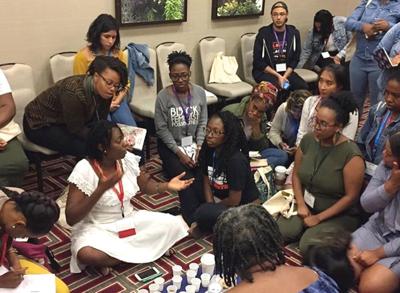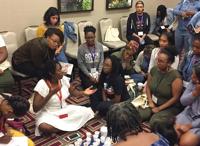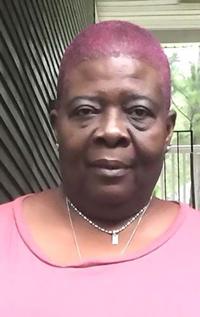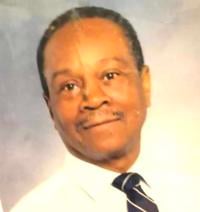During a time marked by a global recession and social unrest, The Miami Foundation saw fit to invest in the one thing it believes matters most – the community.
The philanthropic giant upheld its reputation for championing the needs of underserved communities with the creation of the Racial Equity Fund, which recently provided $2,500 grants to forward-thinking local leaders and $5,000 to nonprofit organizations.
The Racial Equity Fund, as the name suggests, is meant to represent both a response and contribution to conversations concerning race in America.
Rebecca Fishman Lipsey, CEO and president of the foundation, believes established institutions should take action to support those on the front lines fighting racism and equity every day.
“We recognize that there are systems that sustain racial inequity. We want to invest in the building of a society that is equitable, to push people to think about justice and to make sure we are celebrating and recognizing Black leadership by removing the source of inequity,” she said.
According to Fishman Lipsey, the Racial Justice Fund aligns with movements like Black Lives Matter because it is an affirmation that Black leadership holds value, while compelling people to take action, give and be a part of the solution.
“This is a moment where the spotlight is on and we are staring in the face of equity in our community. You can’t unsee it and act like it’s not happening. This is a moment where we need to lean in and embrace challenging truths and be a society that lives out our ideals,” she said.
With the help of corporate investors like Wells Fargo, Google Fiber, The Secular Humanist Fund and Stearns Weaver Miller, the fund was birthed in early June. Funding was distributed in two waves, with the first being awarded to movement-led organizations that may not often receive monetary aid; the second was directed to people inspiring change through local action centered around racial equity work.
No equity without justice
Revolutionary groups such as The Black Collective, Circle of Brotherhood, Power U and Fanm Saj were among the nine nonprofits that received funding.
Ruth Jeannoel, executive director of Fanm Saj, is no stranger to racial equity work and understands how the fund propels the missions of nonprofits like hers.
"The Miami Foundation has led a good pathway in recognizing that there is a need. We are not just here to create equitable standards of living, we are trying to create justice by righting the wrongs of history. Equity wouldn't get us there but justice would," said Jeannoel.
The Haitian activist created the nonprofit in 2018 after realizing that there was a gap in wellness practices like mental health and spirituality in South Florida. In her native tongue “Fanm Saj” refers to a midwife, but to her, it has come to represent someone who takes care of the community.
“While midwives catch babies, Fanm Saj catches communities. We want to practice Black lives matter by living in abundance and having healthy practices. Fanm Saj offers the opportunity to act on what we imagine the world to look like and not just dream about it, but to live it,” Jeannoel added.
The nonprofit prides itself on providing for families across the African Diaspora through sacred healing circles, peace-keeping practices, prayer, restorative justice, affirmations and meditation. The seemingly unconventional practices of Fanm Saj are deeply rooted in cultural history to provide a link between people of color in South Florida and their cultural pasts.
"We live and breathe Blackness and culture. Healing is much more than therapy for women across the African Diaspora, it's the mind, body and spirit. It's important work that people may not think of at first but it helps keep movements alive," concluded Jeannoel.
Using the grant from the Racial Equity Fund, Jeannoel expanded her “leadership quarantine and heal” virtual workshops for Black youth across Miami-Dade County with a focus on nutrition, meditation and art therapy.
Investing in community
Eleven highly influential individuals also reaped the many benefits of the fund, as they were recognized for executing positive impact in their respective communities.
David Jackson, one of the deserving 11, is a Miami native who co-founded Project T.H.U.G. – Transforming Hope and Unifying Generations – with his brother, Rashard Johnson, after being hit with the reality that disparities in education exist among young Black men in inner-city schools. The program consists of an eight-month fellowship designed to create well-rounded individuals by providing eighth graders and high school juniors with the resources they need to flourish in society. The young men are also taught a wide variety of life skills such as leadership and development, lawn mowing, male etiquette, jump-starting cars and business skills through various workshops.
As someone who grew up in the inner-city, Jackson understands the value of investing in community.
“People were leaving the community and not coming back. The people in positions of power or able to make change weren’t from Miami. Our hope is that the seed we plant allows [T.H.U.G. participants] to come back and pour into their community,” said the Syracuse University graduate who has never lost touch with his roots.
Not only does Project T.H.U.G. create opportunities for future investments in marginalized communities, it also provides an outlet for the emotional healing, development and removal of stigmas associated with Black men.
"I was a high school student when Trayvon Martin was killed. Everyone walked out of school and at the time I didn't know why I was doing it too, but as I got older I knew there was something wrong with the way Black boys were perceived in the world,” said Jackson. “Zimmerman referred to [Trayvon] as a thug. Thugs are what we're perceived as first.”
Jackson has made use of the negative connotation of the word for his program to transform the way Black men are viewed in society. Not as an effort to own it but to give it another existence.
Everyday heroes
Community-centered initiatives like Project T.H.U.G. and Fanm Saj demand a lot of work that must be driven by financial support, financial support which has now been received through the Racial Equity Fund.
“As an educator [who is] severely underpaid, using a portion of the paycheck to make sure this thrives is difficult. The award took a huge weight off of our shoulders. Once the financial issue is removed, it gives you room to get to the mission and do more work. The reality that all entrepreneurs face is ‘How can I fund this?’” said Jackson.
He intends to use the award to support things like T.H.U.G.’s “coating” ceremony – a symbolic bestowing of the organization’s coat of arms to the young men who have completed the program – workshop supplies and other resources to benefit the young men served by the program.
Fishman Lipsey is confident that people like Jackson and Jeannoel will make the best use of the award where it truly matters.
“We know that there is an unbelievable group of powerful community heroes moving the needle who may often be overlooked from philanthropic support. This was a moment where we needed to give them an infusion of resources. All of our funds are deeply grounded in a commitment to equity,” said Fishman Lipsey.
Though The Miami Foundation has not yet determined whether the fund will be distributed on an annual basis in the future, Fishman Lipsey hopes to incorporate something similar on Nov. 19 for Give Miami Day with the support of meaningful donations from the community.













